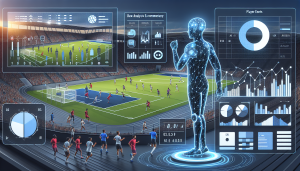 UseCasesFor.ai
UseCasesFor.ai
Choose Topic
 UseCasesFor.ai
UseCasesFor.ai
AI Use Cases
A collection of over 250 uses for artificial intelligence
A continually updated list exploring how different types of AI are used across various industries and AI disciplines,including generative AI use cases, banking AI use cases, AI use cases in healthcare, AI use cases in government, AI use cases in insurance, and more

Sign up
to receive a PDF containing all the use cases and stay updated with the latest AI trends and news (you can always unsubscribe)
Real-time match analysis and commentary

Introduction
The integration of sports with technology has changed the whole process of watching, assessing and comprehending sports. Among the most impactful is the incorporation of Machine Learning (ML), Natural Language Processing (NLP) and Artificial Intelligence (AI) in live match review and broadcast commentary. This integration enables real time analysis of huge data thus providing insights that were not possible to achieve. From performance review to even forecasting future events, artificial intelligence has found its application in almost every field that relates to sports, including athletes, coaches, fans, and managers.
Challenges
Despite the potential, there are a number of issues that have to be addressed in order to integrate ML, NLP and AI into real time match analysis and commentary. These are the problems of handling vast amounts of data collected during matches, data accuracy, and the issue of how to make sense of data to generate valuable information. There is the issue of developing algorithms that are able to comprehend the aspects of sports rules and tactics. Some of the barriers that are legal and ethical in nature such as privacy and data issues are also a big challenge. Last but not the least, there is the problem of user acceptance as many traditional fans and stakeholders may complain of sports being increasingly technologized.
AI Solutions
The application of AI in sports involves the use of ML and NLP to generate automatic and informative commentary by analysing data in real time. It can be possible to teach AI all that is needed to know about the game and learn to break down strategies and make recommendations. There are many companies that have come up with AI solutions for sports which include IBM and SAP. IBM’s Watson super intelligence has been deployed at Wimbledon to help in the analysis of players’ performances and creating highlights. SAP’s Sports One, for instance, leverages big data and artificial intelligence to offer real-time performance information to coaches and athletes. Another main AI application is the automated sports writing that applies NLP to produce game scores and sports news stories. Some of the companies which provide this technology include Automated Insights and Narrative Science. Furthermore, AI can be applied in developing predictive models of performance to help teams and athletes perform better. It is also used in injury prediction and prevention as well as talent identification and development.
Benefits
There are many ways through which AI can be of benefit to the sports industry. It enhances the provision of information and analysis to teams and athletes thereby giving them a edge. It can enhance the fan experience by offering more detailed information and content that is relevant to the specific fan. Automated sports writing can also be useful in saving time and resources while predictive models can assist in formulation of strategies. It will also enhance player safety through injury prediction and prevention and it will also assist teams in identifying talents that may be future stars. Also, AI can offer valuable information and analysis to the broadcasters, advertisers, and other partners, which creates new opportunities for income.
Return on Investment
The ROI for AI in sports can be quite high. Based on a report by PwC, the sports industry in North America was estimated to be worth $73.5 billion in 2019. In the context of sports, AI can provide teams with that critical advantage they require to perform and win, and this could translate to more revenues. As for the broadcasters and advertisers, they can use AI to create more specific and interesting content that will attract more viewers and increase the revenue from advertisements. By using automated sports writing, it is possible to cut costs and increase efficiency of the writing process; predictive models can also assist teams in minimizing the costs of injuries and making smarter decisions on players’ signings.